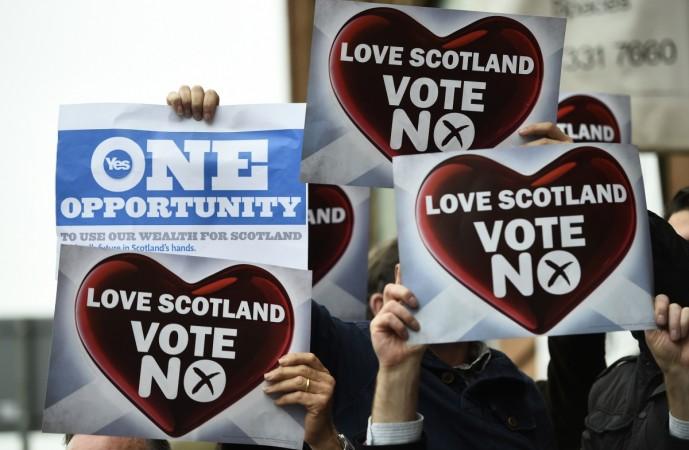
Almost half the people who intend to vote "No" on Thursday's Scottish independence referendum have said that they felt "personally threatened" by the "Yes" Campaign, a new poll suggests, raising fear that people who did not want Scotland to be independent could have been intimidated or threatened by those who are supporting it.
But the apparant negativity that has results out of this, tends to have swayed some important voters towards chosing yes instead.
Two-time Grand Slam winner and 2013 Wimbledom champion has said he would be voting yes, in favour of independence.
In a tweet, the 27 year old tennis ace has blamed "No campaign negativity" for swaying his decision before excitedly saying "Lets do this!".
Huge day for Scotland today! no campaign negativity last few days totally swayed my view on it. excited to see the outcome. lets do this!
— Andy Murray (@andy_murray) September 18, 2014
'Threatened'?
According to Buzzfeed, which reported citing an exclusive poll results conducted by YouGov for the publication, Scotland's no voters felt threatened, were afraid to speak out and thought that their country is more divided.
The research, carried out in the final days of the referendum campaign, found that 46 percent of "No" voters said they had felt threatened by the opposing camp at some point. This was compared to only a quarter of "Yes" voters who said they had felt intimidated.
Almost half of "No" voters (49 percent) said they had not always felt capable of speaking freely about their views on the referendum, while 48 percent felt they had. In contrast, 76 percent of "Yes" backers said that they had always felt capable of speaking freely, and only 21 percent did not.
Reports have noted that the poll also suggested opponents of independence were more likely to have fallen out of friends, family members, colleagues and other people than were supporters of Scotland's independence.
About 85 percent of "No" voters believed the entire issue had made Scottish society more divided, while only 30 percent among the "Yes" supporters held the same view.
Although there is no evidence, that the "Yes" supporters would have personally threatened the "No" supporters, the poll results may fuel allegation by the Better Together campaign that supports of Scotland's independence have tried to intimidate or scare the voters, the Independent notes.














